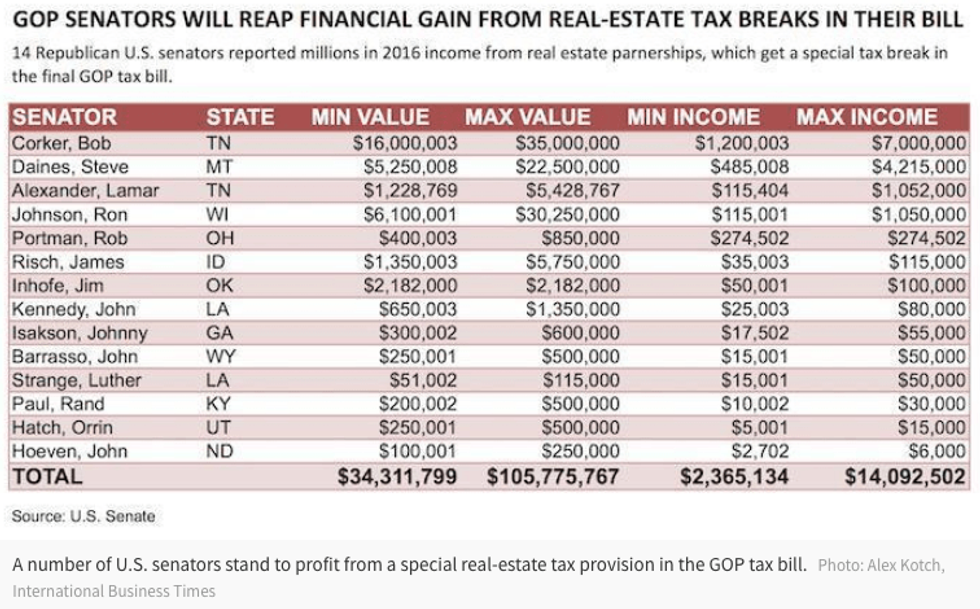The GOP tax bill expected to hit the floor of Congress for a vote Tuesday afternoon has been characterized as legislation "written for Republicans' wealthy campaign contributors," but a report published Monday made clear that Republicans are not just attempting to fatten the already-overflowing pockets of their donors--they're also doing all they can to "feather their own nests."
According to an analysis of federal records by the International Business Times (IBT), a "special provision" buried in the 500-page Republican tax bill--which has come to be known as the #CorkerKickback--could amount to a combined $14 million annual income boost for "more than a quarter of all GOP senators."
As IBT reports:
In all, 14 Republican senators (see list below) hold financial interests in 26 income-generating real-estate partnerships--worth as much as $105 million in total. Those holdings together produced between $2.4 million and $14.1 million in rent and interest income in 2016, according to federal records.
IBT first reported on the tax carve-out, which allows investors in "pass-through" entities, including real-estate partnerships such as LLCs and LPs, with few employees to deduct part of their income that passes through those partnerships.
Along with Sen. Bob Corker (R-Tenn.), one of the wealthiest members of Congress, the other senators who stand to benefit include Orrin Hatch (R-Utah)--who admitted on Monday that he authored the provision--and Ron Johnson, who has an estimated net worth of $36 million. Some of the senators on the list also happen to be recipients of large sums of campaign cash from the real estate industry, IBT adds.
Trump--who has claimed repeatedly and falsely that the tax bill will cost him and his rich friends "a fortune"--could also see a nice profit from the last-minute addition to a bill already stuffed with corporate giveaways. As IBT notes, Trump "owns or directs over 560 companies" that will get a tax cut thanks to the real estate pass-through provision.
The discovery of the #CorkerKickback quickly sparked fury on social media, which translated into intense pressure on Corker and other Republican senators to explain how a measure that would personally enrich them ended up in the final version of their deeply unpopular bill.
In a letter on Monday, Hatch expressed "disgust" at press reports suggesting that the provision may have been included for reasons of self-interest or in an effort to win Corker's vote. But, as IBTreports, Hatch didn't deny that he stands to benefit from the measure he is helping ram through Congress, nor did he "dispute that Corker voted against the Senate bill when it restricted him from getting a personal benefit, and then switched his position and announced his support for the final bill after it included" the "Corker Kickback."
As the lead editorial in Tuesday's New York Times notes, "The tax bill's generosity toward real estate titans stands in stark contrast to its stinginess toward the average wage earner as well as its very real damage to taxpayers in high-cost states."
"Whatever the Republicans' protestations," the Times concluded, "this malodorous loophole is further confirmation that congressional leaders are doing everything they can to maximize benefits for the wealthy at the expense of almost everybody else."


